Key takeaways:
- Building genuine relationships is crucial for successful local business networking, focusing on stories and shared interests rather than just business transactions.
- Referrals enhance trust and credibility, making them more effective than traditional advertising, but require clear communication and follow-up to succeed.
- Trust and understanding the needs of all parties involved are essential to avoid failed referrals; misalignment of expectations and lack of follow-up are common pitfalls.
- Sharing experiences and vulnerability in networking can strengthen connections and foster a supportive community, making storytelling a powerful tool for engagement.
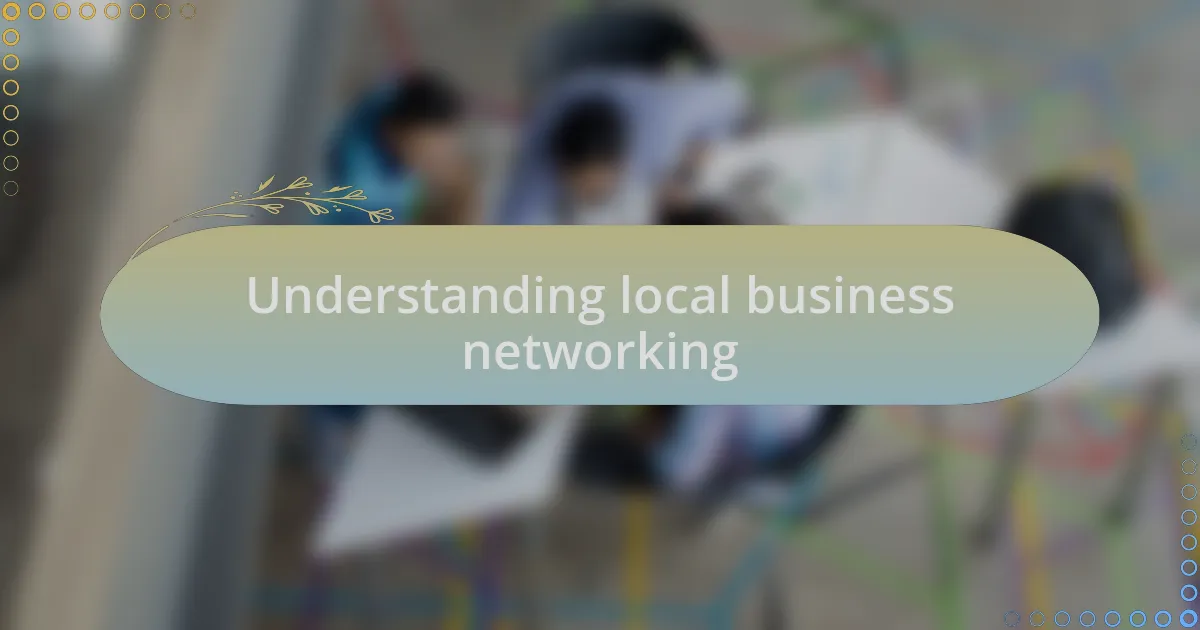
Understanding local business networking
Local business networking is all about building genuine relationships that can lead to referrals and collaborations. I remember my first networking event; I was nervous but excited, grappling with how to connect with strangers. That initial leap opened doors—what if I hadn’t taken that chance?
At its core, networking isn’t just about exchanging business cards; it’s about sharing stories and finding common ground. I often find myself reflecting on the conversations that sparked real connections. How often have you left an event feeling energized from a meaningful discussion with someone who shares your passions?
Engaging with local entrepreneurs gives you a unique pulse on the community. I’ve learned that active participation in networking groups can lead to unexpected opportunities, sometimes from the most unlikely of sources. What surprising connections have you made in your own networking journey?
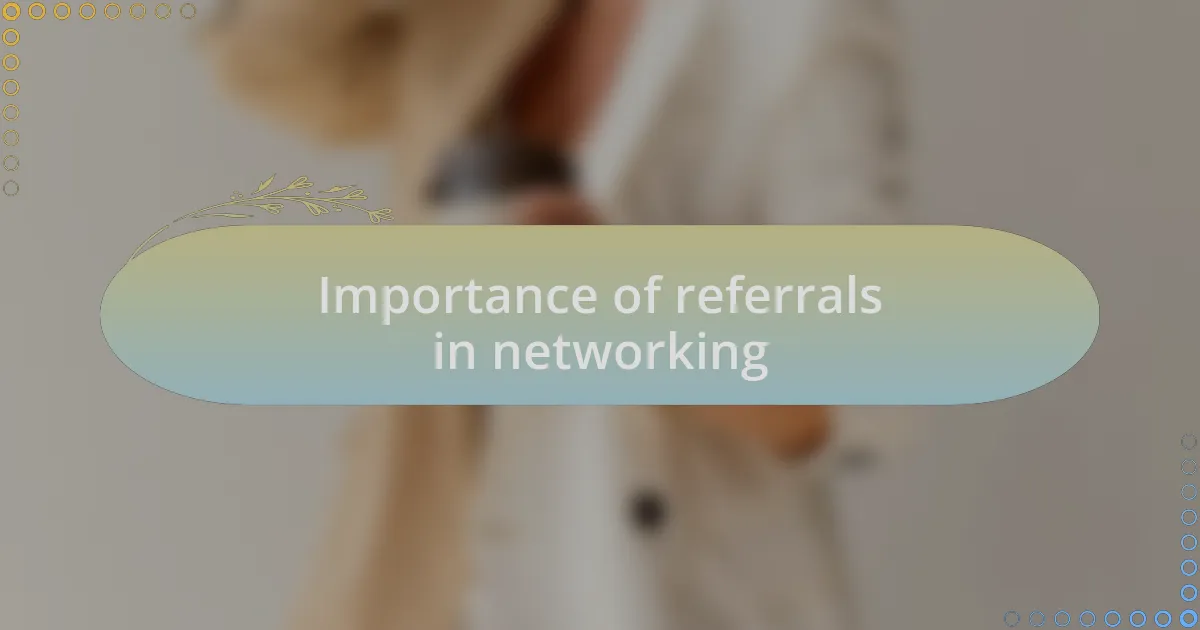
Importance of referrals in networking
Referrals serve as the backbone of local business networking, amplifying trust and credibility. When someone refers a service or product, it’s usually based on a personal relationship, which carries much more weight than conventional advertising. I still remember the time I received a referral that directly led to a successful partnership; it reinforced my belief in the power of genuine connections.
Think about it—how often do you seek opinions before making a decision? Referrals tap into that natural instinct. I’ve had moments when clients chose my services solely because a mutual acquaintance endorsed me. It’s fascinating how one conversation can transform a stranger into a trusted advocate, isn’t it?
Moreover, referrals can unlock doors we didn’t even know existed. I once met someone at a local chamber of commerce meeting who, unbeknownst to me, had extensive connections in industries I’d been trying to penetrate. That initial chat led to a series of warm introductions that reshaped my business landscape. Who are you connecting with today that might open up new opportunities tomorrow?
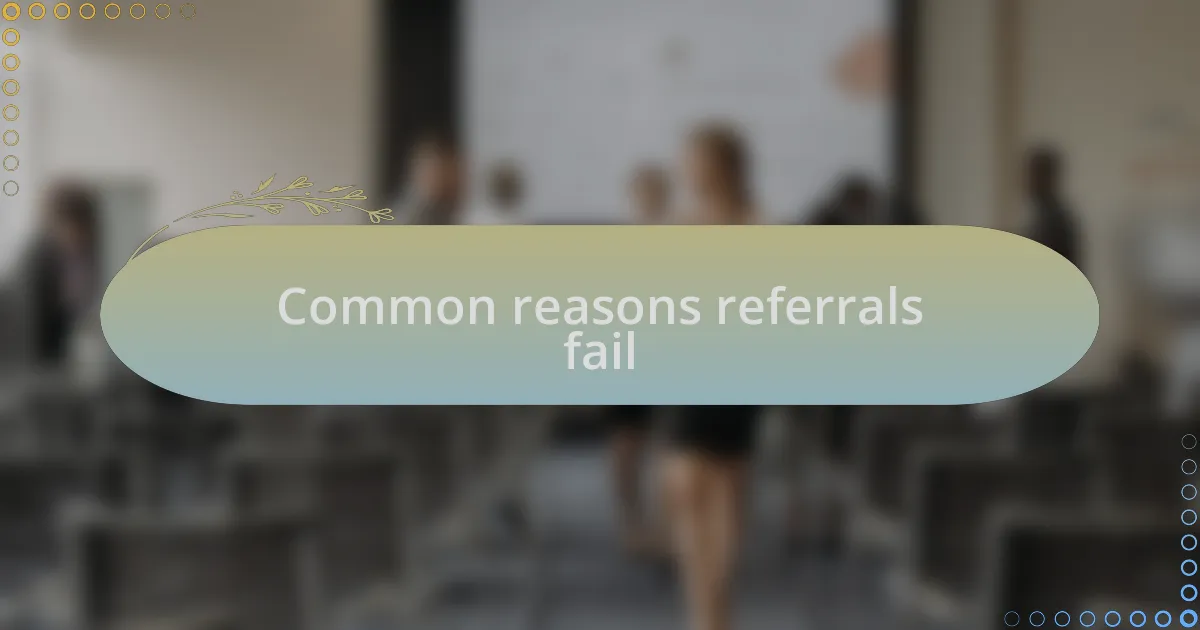
Common reasons referrals fail
When I reflect on the reasons why referrals sometimes falter, I realize that misalignment in expectations is a frequent culprit. I’ve encountered situations where a referred client expected services that weren’t clearly communicated beforehand, leading to disappointment on both sides. It makes me wonder, how often do we clarify what a referral entails?
Another reason referrals can fail is the lack of follow-up. Once, I received a referral for a project I was genuinely excited about, but weeks went by without a word. It taught me the importance of promptly reaching out and maintaining momentum; if you don’t take the initiative, the opportunity can slip away faster than you think. Have you ever regretted not reaching out sooner?
Lastly, trust plays a pivotal role in the referral process. I’ve seen referrals fall flat when the referral source didn’t truly understand the recipient’s needs. For instance, I once referred a local bakery to a friend who was gluten-free, but without the baker’s knowledge of such dietary preferences, it turned into an awkward situation. It leaves me questioning: are we fully aware of what our connections truly need before making those introductions?
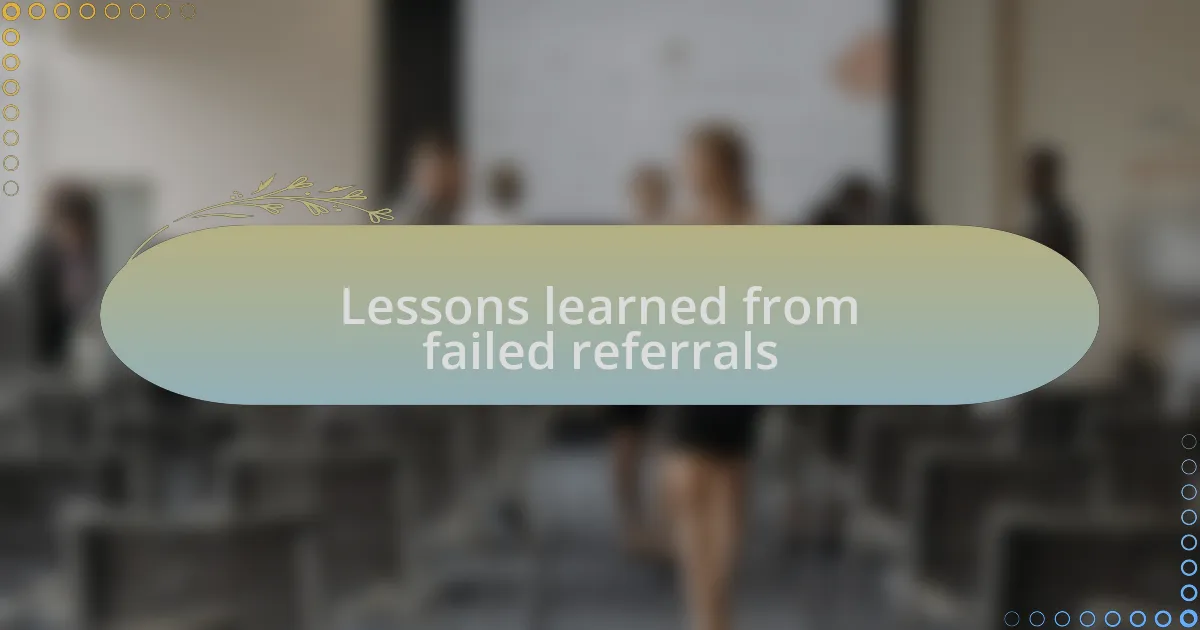
Lessons learned from failed referrals
One of the most striking lessons I’ve learned from failed referrals is the necessity of setting clear expectations right from the start. I once referred an excellent graphic designer to a friend, but I hadn’t communicated the designer’s specific style or process. My friend was surprised by the initial concepts and felt misled. This experience made me realize how crucial it is to discuss each party’s needs thoroughly before making a referral.
Additionally, I’ve come to appreciate the importance of consistent engagement. I remember referring a local handyman to a business associate who desperately needed repairs. Sadly, my contact never reached out, leaving the handyman in the dark. This situation highlights a vital lesson: maintaining communication through follow-ups is essential in nurturing connections. Have you ever felt a sense of missed opportunity because of a simple lack of dialogue?
Trust is another layer in the complex fabric of referrals that has profoundly impacted my networking experience. There was a time when I trusted the judgment of a colleague who recommended a software developer to help with my project. Unfortunately, the developer was more suited for larger companies, leading to delays and frustration. This taught me that while trust is intrinsic to networking, it must be accompanied by a firm understanding of skills and compatibility. How well do we really know the capabilities of those we refer?
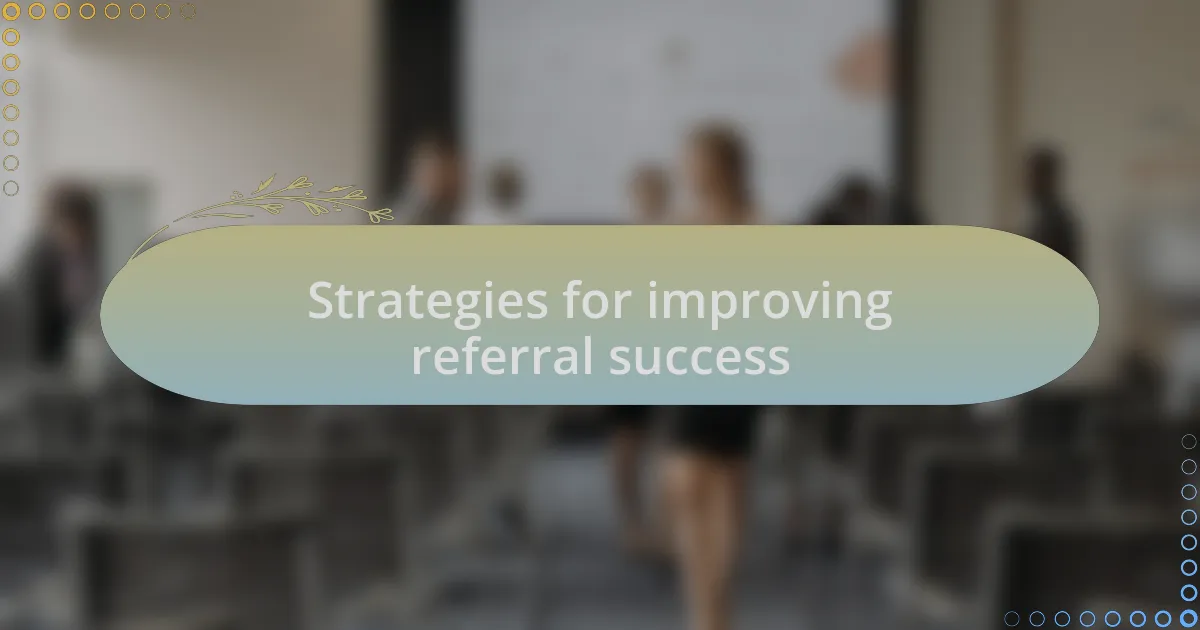
Strategies for improving referral success
When it comes to improving referral success, I’ve found that creating a mutual understanding between all parties is essential. I remember referring a talented photographer to a local cafe owner who desperately needed new images for their marketing. After chatting with both sides beforehand, I clarified the style and expectations, which led to an incredibly fruitful collaboration. It was rewarding to see the results when goals are aligned from the start.
Another strategy I’ve discovered is to establish a follow-up routine. After I made a referral to a web developer for a small business, I decided to check in with both parties a week later. This follow-up not only reminded them of the connection but also provided an opportunity for feedback. I was able to ensure that the initial meeting went smoothly and that both parties felt supported through the process. Have you ever thought about how a simple nudge could spark a successful partnership?
Furthermore, building a solid rapport with the individuals you refer can work wonders. Early on in my networking journey, I made the mistake of recommending a financial advisor without really getting to know their personality and approach. The mismatch led to dissatisfaction on my friend’s side, which left me feeling disheartened. In contrast, taking the time to cultivate relationships and understand each person’s unique approach can greatly enhance the likelihood of a successful referral. What strategies do you employ to ensure the right match?
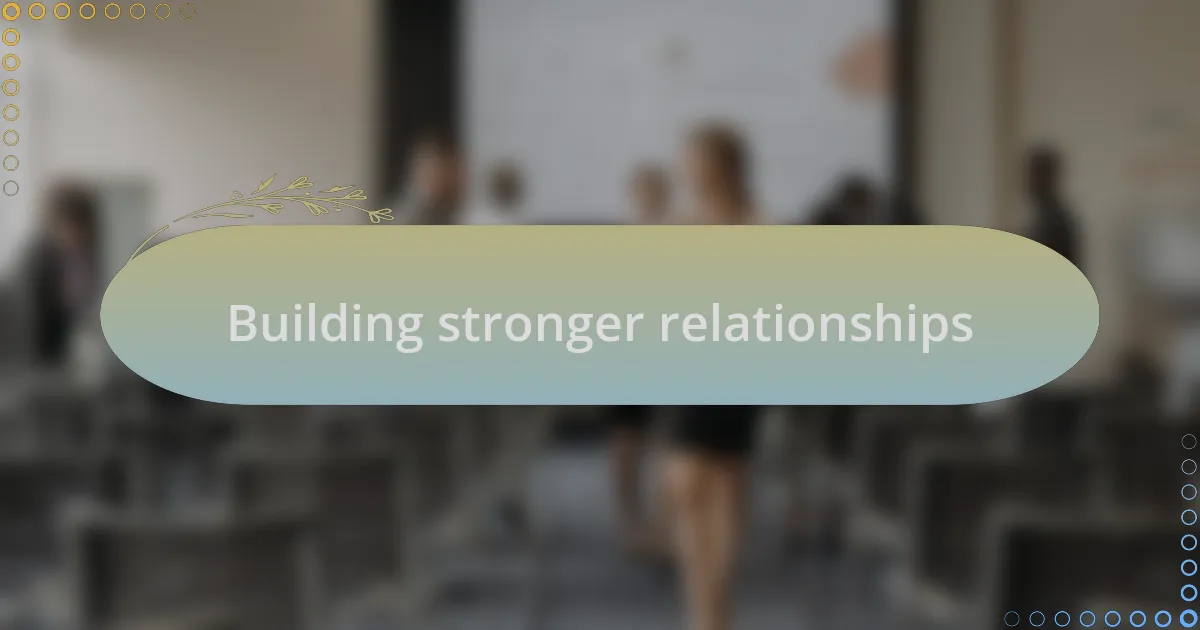
Building stronger relationships
Establishing stronger relationships is about investing time in understanding each person’s style and values. I recall a time when I introduced a local artist to a gallery owner without knowing their individual preferences. The outcome wasn’t ideal, leaving both parties feeling frustrated. If I had taken the time to discuss their visions, the introduction could have ignited an inspiring partnership instead. How many collaborations might fail simply because we overlook the crucial component of personal connection?
Moreover, it’s vital to keep the lines of communication open. I’ve seen how regular check-ins can create an environment of trust. Once, after I introduced a coach to a business owner, I stayed in touch with both to hear their thoughts. This consistent dialogue not only allowed me to address any concerns promptly, but it also reaffirmed their confidence in my referrals. Have you ever considered how just a few words could reinforce a developing relationship?
Lastly, shared experiences can deepen connections significantly. I remember co-hosting a workshop with a fellow entrepreneur, which allowed us to collaborate and truly understand each other’s strengths. That experience not only strengthened our partnership but also showed others the synergy between our businesses. Isn’t it fascinating how active participation together can forge stronger bonds and pave the way for future referrals? Building relationships is often a journey, not just a destination.
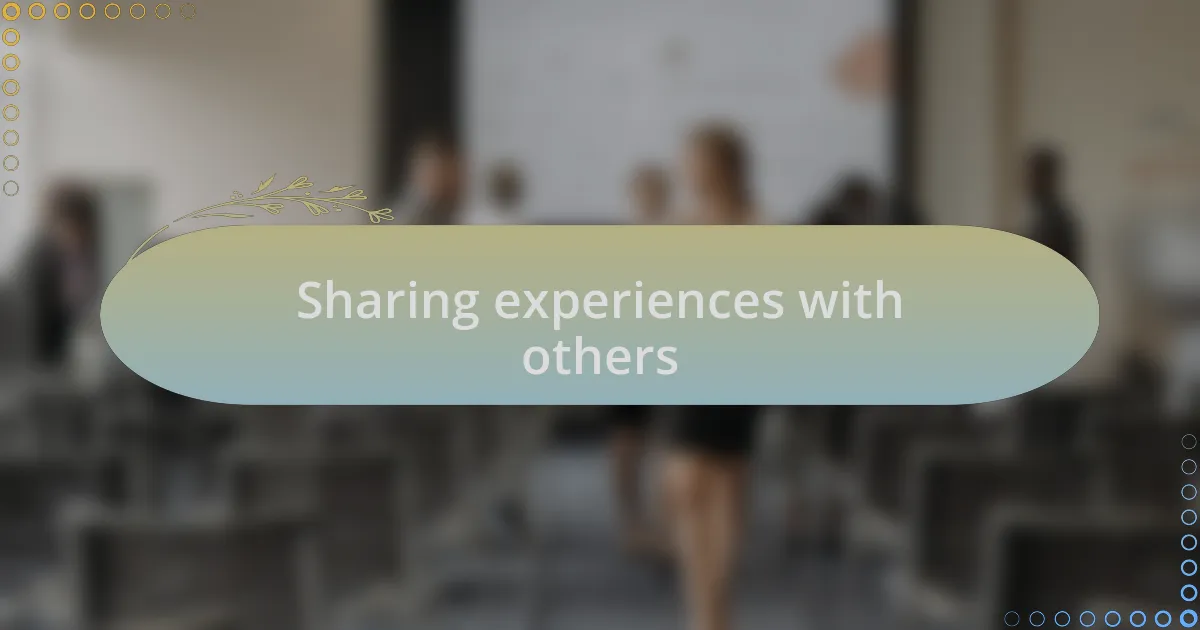
Sharing experiences with others
Sharing experiences with others creates a sense of community that can be incredibly powerful. I remember a time when I shared my struggles with a failed referral at a local networking event. One person chimed in with their own story of woe, and suddenly we had a bond over our shared challenges. How often do we underestimate the impact of vulnerability in networking?
It’s intriguing how storytelling can transform a mundane business interaction into something memorable. A few months ago, I attended a gathering where members shared their significant learning moments. Hearing how someone turned a disastrous introduction into a valuable lesson not only inspired me but also encouraged others to embrace their mistakes. Isn’t it refreshing to realize that we’re all navigating similar paths, filled with ups and downs?
Sometimes, a simple anecdote can motivate others to reflect on their journeys. Recently, I engaged in a discussion with a fellow entrepreneur who recounted their experience with a referral that went wrong. As they articulated their emotions during that time—frustration, disappointment, but also eventual growth—I could feel the resonance in the room. Have you noticed how these shared stories can shift perspectives and foster resilience in our networks?